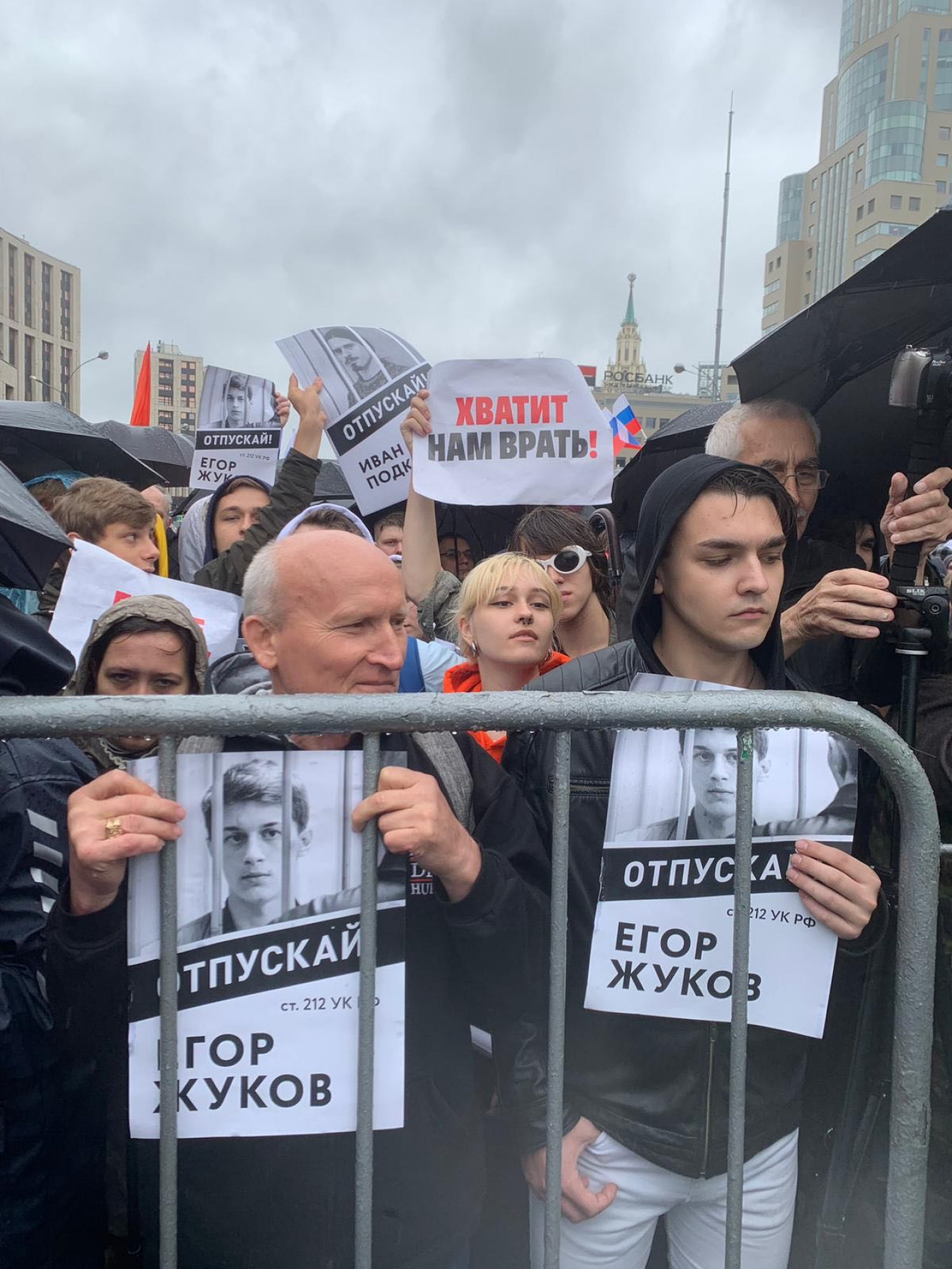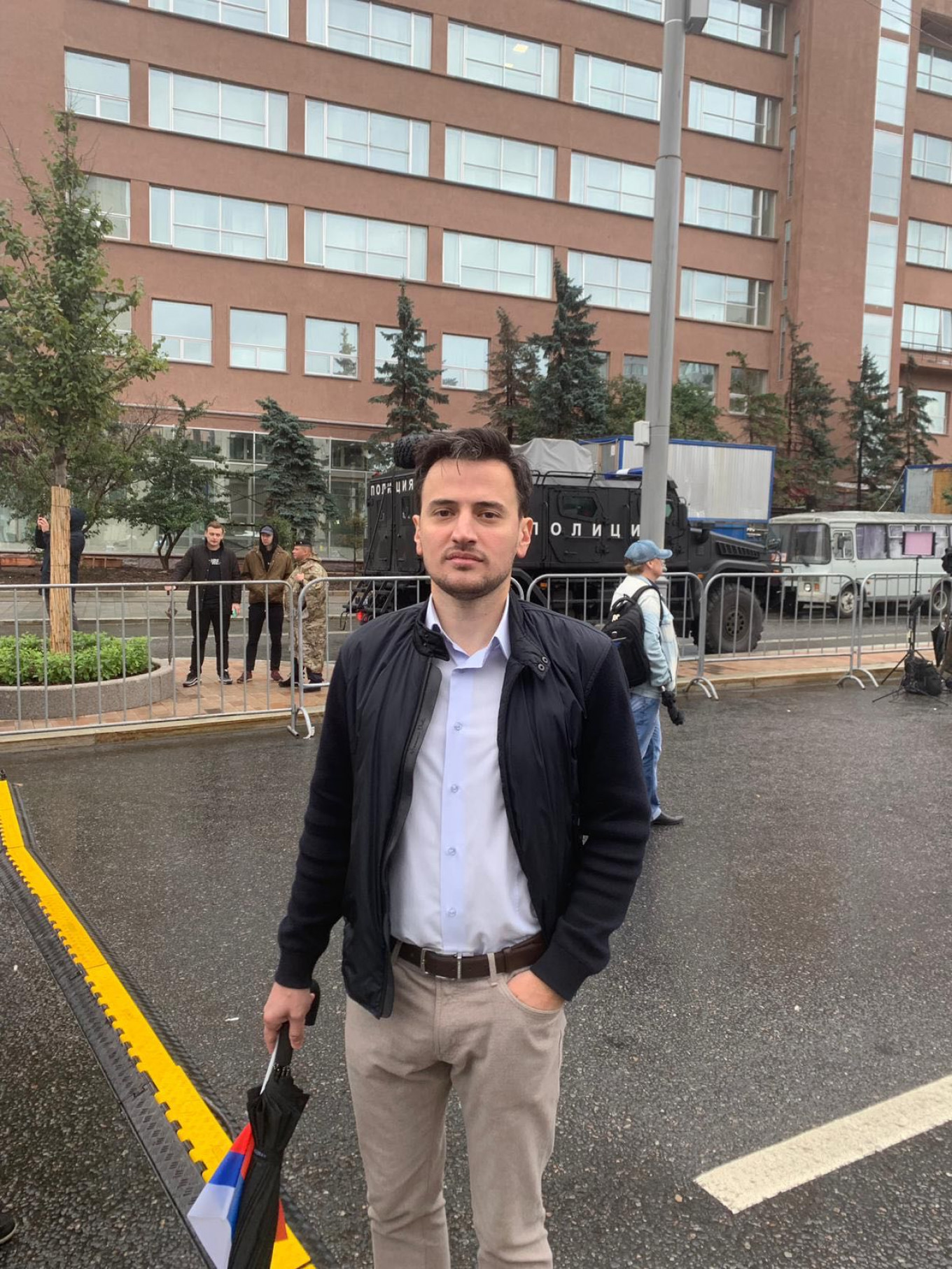Nearly 50,000 people took to Moscow’s streets to rally for fair elections on a rainy Saturday despite weeks of heavy crackdowns, making it one of Russia’s largest protests in several years.
This summer’s protest movement, which began as a standoff between opposition figures and Moscow authorities over the barring of independent candidates from an upcoming local election, has gradually gained support from citizens since it began five weeks ago. Independent polling this week said that Moscow residents are more likely to support the protests than oppose them.
“50,000 is a number that the authorities simply can’t ignore,” said Konstantin Gaaze, a nonresident scholar at the Carnegie Moscow Center think tank. “This sends out a very strong signal and shows that there is real solidarity among protesters.”
This week’s event was largely held in support of those who have been detained and arrested — sometimes violently — over previous protests. Chants calling on Russia to free its political prisoners could be heard along with chants in support of the rejected candidates.
Attendants wore shirts and held up signs in support of Yegor Zhukov, a 21-year-old student who faces up to eight years in prison on “mass unrest” charges, as well as the students who had been detained while picketing Zhukov’s arrest.
 Protesters hold signs saying “Release Yegor Zhukov” Pjotr Sauer / MT
Protesters hold signs saying “Release Yegor Zhukov” Pjotr Sauer / MTThe solidarity has spread outside the capital, with several other Russian cities staging their own protests in solidarity this weekend.
The Moscow event, held the day after the 20-year anniversary of President Vladimir Putin first coming to power, “showed that there are many more non-loyal people than the Kremlin hoped for,” said political analyst and former Kremlin adviser Gleb Pavlovsky. “These people aren’t the traditional opposition, but a much wider group.”
This included celebrities and popular musicians, including YouTube blogger Yury Dud, who has an audience of millions and had previously been largely apolitical. The protest saw performances from three musical acts — IC3PEAK, Krovostok and Face — all of whom are well-known to Russian listeners.
“I had to perform today to show my support,” Anton Chernyak, the lead singer of Krovostok, told The Moscow Times. “It’s great so many people turned up.”
Moscow authorities had authorized a rally for up to 100,000 people following two weekends of unauthorized protests that saw a heavy police crackdown with thousands detained. This weekend’s sanctioned event in Moscow saw only a handful of detentions, according to the police-monitoring OVD-Info website. Eighty people were detained at a similar protest in St. Petersburg, 15 in Rostov-on-Don and two in Briyansk.
 Alexander Solovyov Pjotr Sauer / MT
Alexander Solovyov Pjotr Sauer / MTAndrei Kolesnikov, a senior associate at Carnegie Moscow Center, said the rally’s approval from the authorities helped boost attendance this week.
“It’s natural that people are scared to go to unsanctioned protests,” he told The Moscow Times.
Even so, this week’s turnout dwarfed the numbers of the last authorized rally, which was attended by 22,000 people.
Alexander Solovyov, one of the rejected opposition candidates and ex-chairman of the pro-democracy movement Open Russia, said that the growing momentum is “a victory for the opposition” — but he stressed that the opposition’s work isn’t done yet.
“Some people think that coming out once is enough. We need to keep on protesting every weekend to keep the momentum going,” he told The Moscow Times.
Shortly after the sanctioned rally ended, a crowd of protesters started marching into central Moscow from the protest site. Hundreds were seen gathering near the presidential administration building and chanting “Putin is a thief” as riot police encircled the building and began detaining dozens.
Detentions continued near the Kitay-Gorod metro station as police blocked off several streets in the area, the Mediazona news website reported, in a scene more reminiscent of the heavy crackdowns of past protests.
At least 221 people have been detained in Moscow throughout the day, OVD-Info said.
